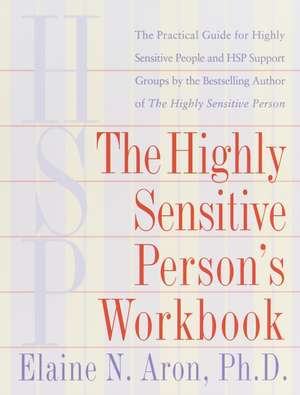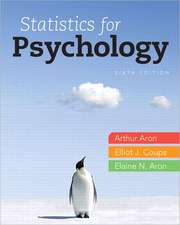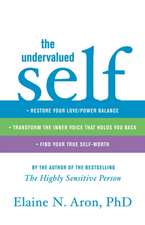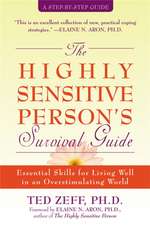The highly sensitive person's workbook: The practical guide for highly sensitive people and HSP support groups bu the bestselling author of The Highly Sensitive Person
Autor Elaine N. Aronen Limba Engleză Paperback – 31 mai 1999
Do noise and confusion quickly overwhelm you? Do you have a rich inner life and intense dreams? Did parents or teachers call you "too shy" or "too sensitive"? If you answered yes to any of these questions, you may be a Highly Sensitive Person (HSP).
High sensitivity is a trait shared by 20 percent of the population, according to Dr. Elaine Aron, a clinical psychologist and workshop leader and the bestselling author of The Highly Sensitive Person. The enormous response to her book led Dr. Aron to create The Highly Sensitive Person's Workbook, designed to honor that long-ignored, trampled-on part of yourself--your sensitivity. A collection of exercises and activities for both individuals and groups, this workbook will help you identify the HSP trait in yourself, nurture the new, positive self-image you deserve, and create a fuller, richer life. You will be able to:
Identify your specific sensitivities with self-assessment tests
Reframe past experiences in a more positive light
Interpret dreams and relate them to your sensitivity
Cope with overarousal through relaxation, breathing, and visualization techniques
Describe your trait in a work interview or to an unsympathetic family member, new friend, doctor, or therapist
Preț: 118.78 lei
Nou
Puncte Express: 178
Preț estimativ în valută:
22.73€ • 23.48$ • 18.91£
22.73€ • 23.48$ • 18.91£
Carte disponibilă
Livrare economică 26 februarie-12 martie
Preluare comenzi: 021 569.72.76
Specificații
ISBN-13: 9780767903370
ISBN-10: 0767903374
Pagini: 336
Dimensiuni: 178 x 230 x 19 mm
Greutate: 0.53 kg
Editura: HARMONY
ISBN-10: 0767903374
Pagini: 336
Dimensiuni: 178 x 230 x 19 mm
Greutate: 0.53 kg
Editura: HARMONY
Notă biografică
Elaine N. Aron, Ph.D., earned her doctorate from Pacifica Graduate Institute and trained at the Jung Institute in San Francisco. The author of The Highly Sensitive Person, she is widely published in academic journals and conducts workshops for HSPs around the country. She divides her time between San Francisco and New York.
Extras
Getting to Know Your Sensitivity
With the tasks in this chapter, you will become better acquainted with your sensitive self and some of the basic skills HSPs need, like how to speak up in defense of your sensitivity and how to understand your role in your world. But to do that, you need a little more information about your trait. So your very first task is simply to read and absorb.
If It's So Normal, Why Do I Sometimes Feel So Different?
The following five points are very important for all HSPs to grasp and remember:
1. Overstimulation means overarousal. In everyone, sensitive or not, overstimulation always leads to physiological overarousal. You know you are overaroused when you feel overwhelmed or exhausted in a total-body, can't-work, can't-coordinate, can't-relax, brain-frazzled way. You may have a pounding heart; churning stomach; trembling hands; shallow breath; or hot, flushed, damp, or cold skin.
2. It's important to maintain an optimal level of arousal. Absolutely everyone, sensitive or not, always performs worse and feels bad when overaroused. They can't hit a ball, think of witty things to say, or enjoy what's going on around them. Everyone dislikes being underaroused too. That's boredom. Again, you'll be too dull to hit the ball, make the remark, or enjoy the show. Starting at birth, organisms seek an optimal level of arousal, not too much or too little, and they seek it as incessantly and eagerly, and usually unconsciously, as they seek air, food, and water. They do that by regulating how much stimulation or input they receive.
3. HSPs are more easily overaroused. In the Introduction I defined this trait as being aware of subtleties by more deeply processing stimulation. If we HSPs are going to be aware of stimulation others would not even notice, in a highly stimulating situation we will necessarily receive more input and become overaroused more quickly. Once we are overaroused, we are like anyone else overaroused-we perform and feel worse. We almost have to blow it when the supervisor is watching, or say something inane during the opening moments of a first date. These settings may push some blas? non-HSPs out of lethargy into their optimal level of arousal and performance. But we HSPs are more likely to be pushed beyond our optimal level, into overarousal.
Since we are more easily overaroused, we have more experiences of "failing" under pressure and not enjoying what we are "supposed to" enjoy. No wonder we begin to seem lacking in confidence, not much "fun," sensitive to criticism, or shy (in particular, see Chapter 5 for a discussion of the origins of shyness in HSPs).
The bottom line here is that although we and those around us do enjoy the assets that come with our sensitivity-our extra awareness, empathy, creativity, spirituality, and so forth-we and others must also accept the inevitable downside, the tendency to be more easily overwhelmed. It's a package deal.
4. Sensitivity is not our culture's ideal. Most of you reading this happen to live in a highly competitive, technological, media- and consumer-driven culture that is now influencing values throughout the globe. And right now it values the ability to handle high levels of stimulation over the ability to detect subtleties.
In some cultures sensitivity is highly admired. For example, a study found that Chinese elementary children who are "sensitive and quiet" are among the most respected and liked by their peers, but in Canada they are among the least respected and liked. Sensitivity is valued in traditional China, Japan, and Europe, and also in most cultures living close to the earth, which need their trackers, herbalists, and shamans. But cultures that are very aggressive, expansive, or stressed, or have many immigrants value insensitive, tough, risk-taking personalities to work long hours, go to war, and so forth.
5. HSPs are more affected than others by being raised in bad home environments. My research has shown that HSPs who have experienced traumas or troubled home environments in childhood are more depressed, anxious, and tense than HSPs with easier personal histories, and also more distressed than non-HSPs with similar histories. This is often another reason why HSPs feel different-they are still troubled by events or circumstances that others would be over by now. And because HSPs who have had troubled childhoods are especially distressed as adults, the trait becomes associated for everyone with anxiety and depression. But HSPs without a troubled past are no more psychologically distressed than anyone else-sometimes less so. That's important to remember. Depression or anxiety is not the basic trait of an HSP and they can be healed. Although that type of healing work is not the main focus of this workbook, Chapter 8 will provide a few nudges along the path.
Sensitivity in a Cultural Context
Our culture needs us more than it knows, so there's an important social as well as personal reason for you to feel more empowered. A little history shows why this is. Aggressive, expansive cultures-the kind that do not value sensitivity-appeared about five thousand years ago in Europe and Asia, when nomadic herding tribes emerged from the steppes of Eurasia and took over the more peaceful peoples then living in Europe, the Middle East, and India. The usurpers spoke a language, Indo-European, which was the precursor of Greek, Latin, English, German, French, Spanish, Hindi, and many other languages as well. They brought a culture that, like the language, would spread into North and South America and eventually dominate most of the globe. There were similar incursions of nomads moving eastward, into China (hence the protective Great Wall was built) and Japan. The ancestors of the Greeks and Romans were the same sort of nomadic upstarts. Still later waves of nomadic "barbarians" such as the Huns and Mongols destroyed the empires of those who had gone before.
The nomads' philosophy was more herds, requiring more land, requiring attacks on other tribes, resulting in more captured women (they killed captured men and children) to have more sons to capture more herds, more land, more women to have more sons, more herds, and so forth. When the nomads took over the prosperous but unfortified cities of the agrarian and trading people that had attracted them out of their arid plains, they transformed the people into slaves and soldiers, the towns into fortresses, and the societies into empires. The order of the day: The best defense is a good offense, and survival requires an expanding economy. Sound familiar?
The Indo-European language and culture has taken over most of the globe. The more peaceful cultures such as the Native Americans and Australian aborigines have kind of been eaten for breakfast. Not all of these "prehistoric" cultures were primitive either. In Europe, the Middle East, India, and parts of North and South America, these earlier societies had developed large cities, sometimes with running water, metallurgy, and the beginnings of written language. But at least in Europe, the Middle East, and India, most of these cities were without kings, slaves, castles, or fortifications. There were no wars and very few signs of class distinctions among the people. Government was simple: In good times, food was brought into a temple complex and in hard times it was distributed. Except for overseeing trading activities, that seems to have been the extent of the central authorities.
In contrast, consider Indo-European governments-your culture's government, give or take some ethnic flavoring, whatever your race, if you grew up in an Indo-European-language-speaking culture. Aggressive cultures always have two ruling classes: the warrior kings and the priestly advisors (what I called "royal advisors" in The Highly Sensitive Person).
Who are the warrior kings? The ones who want to conquer everything. Go off to war immediately. In today's corporate world, they want to expand their markets, cut costs, apply the insecticides, and cut the trees. The priestly advisors are there to put the brakes on and point out the long-term effects, which have to be considered too. They do this braking through their roles of consultants, teachers, counselors, judges, artists, historians, and scientists, as well as through their social and personal power as healers and religious authorities.
Although HSPs have probably always been found in all walks of life and classes in society, it seems obvious that where there has been a need for "priestly advisors," we HSPs have traditionally filled that niche. Our brains are designed to enjoy reflection. In the past we were the very essence of the ideal schoolmarm or schoolmaster, family doctor, nurse, judge, lawyer, president (think of Abe Lincoln), artist, scientist, preacher, priest, and plain old conscientious citizen.
Today, however, we HSPs are finding a hard time managing in almost all of our traditional roles. As technology increases and costs are cut in order to compete in the global economy, people who can work long hours under stress are valued more than those who cannot. But an aggressive society without sensitive counselors to temper its aggressiveness is certainly going to get into trouble. HSPs have many other qualities needed by business and government. But it will take time for the warrior kings to understand that.
Should we have a "we-them" attitude? Not permanently perhaps, but for a while you will need it. Let yourself be a little proud about your trait, just temporarily, as an antidote to past feelings of inferiority. For now it's okay to think things like, "I am just being myself and they will have to adjust." The world needs us back in our central, influential position in society. To do that, we need to value ourselves, which will help others value us as well.
In sum, as you proceed through this workbook, remember that you are not just helping yourself. Slowly, HSP by HSP, we are restoring an essential balance to the world's dominant, in all senses, culture.
Now you are ready for your first task.Getting to Know Your Sensitivity
With the tasks in this chapter, you will become better acquainted with your sensitive self and some of the basic skills HSPs need, like how to speak up in defense of your sensitivity and how to understand your role in your world. But to do that, you need a little more information about your trait. So your very first task is simply to read and absorb.
If It's So Normal, Why Do I Sometimes Feel So Different?
The following five points are very important for all HSPs to grasp and remember:
1. Overstimulation means overarousal. In everyone, sensitive or not, overstimulation always leads to physiological overarousal. You know you are overaroused when you feel overwhelmed or exhausted in a total-body, can't-work, can't-coordinate, can't-relax, brain-frazzled way. You may have a pounding heart; churning stomach; trembling hands; shallow breath; or hot, flushed, damp, or cold skin.
2. It's important to maintain an optimal level of arousal. Absolutely everyone, sensitive or not, always performs worse and feels bad when overaroused. They can't hit a ball, think of witty things to say, or enjoy what's going on around them. Everyone dislikes being underaroused too. That's boredom. Again, you'll be too dull to hit the ball, make the remark, or enjoy the show. Starting at birth, organisms seek an optimal level of arousal, not too much or too little, and they seek it as incessantly and eagerly, and usually unconsciously, as they seek air, food, and water. They do that by regulating how much stimulation or input they receive.
3. HSPs are more easily overaroused. In the Introduction I defined this trait as being aware of subtleties by more deeply processing stimulation. If we HSPs are going to be aware of stimulation others would not even notice, in a highly stimulating situation we will necessarily receive more input and become overaroused more quickly. Once we are overaroused, we are like anyone else overaroused--we perform and feel worse. We almost have to blow it when the supervisor is watching, or say something inane during the opening moments of a first date. These settings may push some blasé non-HSPs out of lethargy into their optimal level of arousal and performance. But we HSPs are more likely to be pushed beyond our optimal level, into overarousal.
Since we are more easily overaroused, we have more experiences of "failing" under pressure and not enjoying what we are "supposed to" enjoy. No wonder we begin to seem lacking in confidence, not much "fun," sensitive to criticism, or shy (in particular, see Chapter 5 for a discussion of the origins of shyness in HSPs).
The bottom line here is that although we and those around us do enjoy the assets that come with our sensitivity--our extra awareness, empathy, creativity, spirituality, and so forth--we and others must also accept the inevitable downside, the tendency to be more easily overwhelmed. It's a package deal.
4. Sensitivity is not our culture's ideal. Most of you reading this happen to live in a highly competitive, technological, media- and consumer-driven culture that is now influencing values throughout the globe. And right now it values the ability to handle high levels of stimulation over the ability to detect subtleties.
In some cultures sensitivity is highly admired. For example, a study found that Chinese elementary children who are "sensitive and quiet" are among the most respected and liked by their peers, but in Canada they are among the least respected and liked. Sensitivity is valued in traditional China, Japan, and Europe, and also in most cultures living close to the earth, which need their trackers, herbalists, and shamans. But cultures that are very aggressive, expansive, or stressed, or have many immigrants value insensitive, tough, risk-taking personalities to work long hours, go to war, and so forth.
5. HSPs are more affected than others by being raised in bad home environments. My research has shown that HSPs who have experienced traumas or troubled home environments in childhood are more depressed, anxious, and tense than HSPs with easier personal histories, and also more distressed than non-HSPs with similar histories. This is often another reason why HSPs feel different--they are still troubled by events or circumstances that others would be over by now. And because HSPs who have had troubled childhoods are especially distressed as adults, the trait becomes associated for everyone with anxiety and depression. But HSPs without a troubled past are no more psychologically distressed than anyone else--sometimes less so. That's important to remember. Depression or anxiety is not the basic trait of an HSP and they can be healed. Although that type of healing work is not the main focus of this workbook, Chapter 8 will provide a few nudges along the path.
Sensitivity in a Cultural Context
Our culture needs us more than it knows, so there's an important social as well as personal reason for you to feel more empowered. A little history shows why this is. Aggressive, expansive cultures--the kind that do not value sensitivity--appeared about five thousand years ago in Europe and Asia, when nomadic herding tribes emerged from the steppes of Eurasia and took over the more peaceful peoples then living in Europe, the Middle East, and India. The usurpers spoke a language, Indo-European, which was the precursor of Greek, Latin, English, German, French, Spanish, Hindi, and many other languages as well. They brought a culture that, like the language, would spread into North and South America and eventually dominate most of the globe. There were similar incursions of nomads moving eastward, into China (hence the protective Great Wall was built) and Japan. The ancestors of the Greeks and Romans were the same sort of nomadic upstarts. Still later waves of nomadic "barbarians" such as the Huns and Mongols destroyed the empires of those who had gone before.
The nomads' philosophy was more herds, requiring more land, requiring attacks on other tribes, resulting in more captured women (they killed captured men and children) to have more sons to capture more herds, more land, more women to have more sons, more herds, and so forth. When the nomads took over the prosperous but unfortified cities of the agrarian and trading people that had attracted them out of their arid plains, they transformed the people into slaves and soldiers, the towns into fortresses, and the societies into empires. The order of the day: The best defense is a good offense, and survival requires an expanding economy. Sound familiar?
The Indo-European language and culture has taken over most of the globe. The more peaceful cultures such as the Native Americans and Australian aborigines have kind of been eaten for breakfast. Not all of these "prehistoric" cultures were primitive either. In Europe, the Middle East, India, and parts of North and South America, these earlier societies had developed large cities, sometimes with running water, metallurgy, and the beginnings of written language. But at least in Europe, the Middle East, and India, most of these cities were without kings, slaves, castles, or fortifications. There were no wars and very few signs of class distinctions among the people. Government was simple: In good times, food was brought into a temple complex and in hard times it was distributed. Except for overseeing trading activities, that seems to have been the extent of the central authorities.
In contrast, consider Indo-European governments--your culture's government, give or take some ethnic flavoring, whatever your race, if you grew up in an Indo-European-language-speaking culture. Aggressive cultures always have two ruling classes: the warrior kings and the priestly advisors (what I called "royal advisors" in The Highly Sensitive Person).
Who are the warrior kings? The ones who want to conquer everything. Go off to war immediately. In today's corporate world, they want to expand their markets, cut costs, apply the insecticides, and cut the trees. The priestly advisors are there to put the brakes on and point out the long-term effects, which have to be considered too. They do this braking through their roles of consultants, teachers, counselors, judges, artists, historians, and scientists, as well as through their social and personal power as healers and religious authorities.
Although HSPs have probably always been found in all walks of life and classes in society, it seems obvious that where there has been a need for "priestly advisors," we HSPs have traditionally filled that niche. Our brains are designed to enjoy reflection. In the past we were the very essence of the ideal schoolmarm or schoolmaster, family doctor, nurse, judge, lawyer, president (think of Abe Lincoln), artist, scientist, preacher, priest, and plain old conscientious citizen.
Today, however, we HSPs are finding a hard time managing in almost all of our traditional roles. As technology increases and costs are cut in order to compete in the global economy, people who can work long hours under stress are valued more than those who cannot. But an aggressive society without sensitive counselors to temper its aggressiveness is certainly going to get into trouble. HSPs have many other qualities needed by business and government. But it will take time for the warrior kings to understand that.
Should we have a "we-them" attitude? Not permanently perhaps, but for a while you will need it. Let yourself be a little proud about your trait, just temporarily, as an antidote to past feelings of inferiority. For now it's okay to think things like, "I am just being myself and they will have to adjust." The world needs us back in our central, influential position in society. To do that, we need to value ourselves, which will help others value us as well.
In sum, as you proceed through this workbook, remember that you are not just helping yourself. Slowly, HSP by HSP, we are restoring an essential balance to the world's dominant, in all senses, culture.
Now you are ready for your first task.
With the tasks in this chapter, you will become better acquainted with your sensitive self and some of the basic skills HSPs need, like how to speak up in defense of your sensitivity and how to understand your role in your world. But to do that, you need a little more information about your trait. So your very first task is simply to read and absorb.
If It's So Normal, Why Do I Sometimes Feel So Different?
The following five points are very important for all HSPs to grasp and remember:
1. Overstimulation means overarousal. In everyone, sensitive or not, overstimulation always leads to physiological overarousal. You know you are overaroused when you feel overwhelmed or exhausted in a total-body, can't-work, can't-coordinate, can't-relax, brain-frazzled way. You may have a pounding heart; churning stomach; trembling hands; shallow breath; or hot, flushed, damp, or cold skin.
2. It's important to maintain an optimal level of arousal. Absolutely everyone, sensitive or not, always performs worse and feels bad when overaroused. They can't hit a ball, think of witty things to say, or enjoy what's going on around them. Everyone dislikes being underaroused too. That's boredom. Again, you'll be too dull to hit the ball, make the remark, or enjoy the show. Starting at birth, organisms seek an optimal level of arousal, not too much or too little, and they seek it as incessantly and eagerly, and usually unconsciously, as they seek air, food, and water. They do that by regulating how much stimulation or input they receive.
3. HSPs are more easily overaroused. In the Introduction I defined this trait as being aware of subtleties by more deeply processing stimulation. If we HSPs are going to be aware of stimulation others would not even notice, in a highly stimulating situation we will necessarily receive more input and become overaroused more quickly. Once we are overaroused, we are like anyone else overaroused-we perform and feel worse. We almost have to blow it when the supervisor is watching, or say something inane during the opening moments of a first date. These settings may push some blas? non-HSPs out of lethargy into their optimal level of arousal and performance. But we HSPs are more likely to be pushed beyond our optimal level, into overarousal.
Since we are more easily overaroused, we have more experiences of "failing" under pressure and not enjoying what we are "supposed to" enjoy. No wonder we begin to seem lacking in confidence, not much "fun," sensitive to criticism, or shy (in particular, see Chapter 5 for a discussion of the origins of shyness in HSPs).
The bottom line here is that although we and those around us do enjoy the assets that come with our sensitivity-our extra awareness, empathy, creativity, spirituality, and so forth-we and others must also accept the inevitable downside, the tendency to be more easily overwhelmed. It's a package deal.
4. Sensitivity is not our culture's ideal. Most of you reading this happen to live in a highly competitive, technological, media- and consumer-driven culture that is now influencing values throughout the globe. And right now it values the ability to handle high levels of stimulation over the ability to detect subtleties.
In some cultures sensitivity is highly admired. For example, a study found that Chinese elementary children who are "sensitive and quiet" are among the most respected and liked by their peers, but in Canada they are among the least respected and liked. Sensitivity is valued in traditional China, Japan, and Europe, and also in most cultures living close to the earth, which need their trackers, herbalists, and shamans. But cultures that are very aggressive, expansive, or stressed, or have many immigrants value insensitive, tough, risk-taking personalities to work long hours, go to war, and so forth.
5. HSPs are more affected than others by being raised in bad home environments. My research has shown that HSPs who have experienced traumas or troubled home environments in childhood are more depressed, anxious, and tense than HSPs with easier personal histories, and also more distressed than non-HSPs with similar histories. This is often another reason why HSPs feel different-they are still troubled by events or circumstances that others would be over by now. And because HSPs who have had troubled childhoods are especially distressed as adults, the trait becomes associated for everyone with anxiety and depression. But HSPs without a troubled past are no more psychologically distressed than anyone else-sometimes less so. That's important to remember. Depression or anxiety is not the basic trait of an HSP and they can be healed. Although that type of healing work is not the main focus of this workbook, Chapter 8 will provide a few nudges along the path.
Sensitivity in a Cultural Context
Our culture needs us more than it knows, so there's an important social as well as personal reason for you to feel more empowered. A little history shows why this is. Aggressive, expansive cultures-the kind that do not value sensitivity-appeared about five thousand years ago in Europe and Asia, when nomadic herding tribes emerged from the steppes of Eurasia and took over the more peaceful peoples then living in Europe, the Middle East, and India. The usurpers spoke a language, Indo-European, which was the precursor of Greek, Latin, English, German, French, Spanish, Hindi, and many other languages as well. They brought a culture that, like the language, would spread into North and South America and eventually dominate most of the globe. There were similar incursions of nomads moving eastward, into China (hence the protective Great Wall was built) and Japan. The ancestors of the Greeks and Romans were the same sort of nomadic upstarts. Still later waves of nomadic "barbarians" such as the Huns and Mongols destroyed the empires of those who had gone before.
The nomads' philosophy was more herds, requiring more land, requiring attacks on other tribes, resulting in more captured women (they killed captured men and children) to have more sons to capture more herds, more land, more women to have more sons, more herds, and so forth. When the nomads took over the prosperous but unfortified cities of the agrarian and trading people that had attracted them out of their arid plains, they transformed the people into slaves and soldiers, the towns into fortresses, and the societies into empires. The order of the day: The best defense is a good offense, and survival requires an expanding economy. Sound familiar?
The Indo-European language and culture has taken over most of the globe. The more peaceful cultures such as the Native Americans and Australian aborigines have kind of been eaten for breakfast. Not all of these "prehistoric" cultures were primitive either. In Europe, the Middle East, India, and parts of North and South America, these earlier societies had developed large cities, sometimes with running water, metallurgy, and the beginnings of written language. But at least in Europe, the Middle East, and India, most of these cities were without kings, slaves, castles, or fortifications. There were no wars and very few signs of class distinctions among the people. Government was simple: In good times, food was brought into a temple complex and in hard times it was distributed. Except for overseeing trading activities, that seems to have been the extent of the central authorities.
In contrast, consider Indo-European governments-your culture's government, give or take some ethnic flavoring, whatever your race, if you grew up in an Indo-European-language-speaking culture. Aggressive cultures always have two ruling classes: the warrior kings and the priestly advisors (what I called "royal advisors" in The Highly Sensitive Person).
Who are the warrior kings? The ones who want to conquer everything. Go off to war immediately. In today's corporate world, they want to expand their markets, cut costs, apply the insecticides, and cut the trees. The priestly advisors are there to put the brakes on and point out the long-term effects, which have to be considered too. They do this braking through their roles of consultants, teachers, counselors, judges, artists, historians, and scientists, as well as through their social and personal power as healers and religious authorities.
Although HSPs have probably always been found in all walks of life and classes in society, it seems obvious that where there has been a need for "priestly advisors," we HSPs have traditionally filled that niche. Our brains are designed to enjoy reflection. In the past we were the very essence of the ideal schoolmarm or schoolmaster, family doctor, nurse, judge, lawyer, president (think of Abe Lincoln), artist, scientist, preacher, priest, and plain old conscientious citizen.
Today, however, we HSPs are finding a hard time managing in almost all of our traditional roles. As technology increases and costs are cut in order to compete in the global economy, people who can work long hours under stress are valued more than those who cannot. But an aggressive society without sensitive counselors to temper its aggressiveness is certainly going to get into trouble. HSPs have many other qualities needed by business and government. But it will take time for the warrior kings to understand that.
Should we have a "we-them" attitude? Not permanently perhaps, but for a while you will need it. Let yourself be a little proud about your trait, just temporarily, as an antidote to past feelings of inferiority. For now it's okay to think things like, "I am just being myself and they will have to adjust." The world needs us back in our central, influential position in society. To do that, we need to value ourselves, which will help others value us as well.
In sum, as you proceed through this workbook, remember that you are not just helping yourself. Slowly, HSP by HSP, we are restoring an essential balance to the world's dominant, in all senses, culture.
Now you are ready for your first task.Getting to Know Your Sensitivity
With the tasks in this chapter, you will become better acquainted with your sensitive self and some of the basic skills HSPs need, like how to speak up in defense of your sensitivity and how to understand your role in your world. But to do that, you need a little more information about your trait. So your very first task is simply to read and absorb.
If It's So Normal, Why Do I Sometimes Feel So Different?
The following five points are very important for all HSPs to grasp and remember:
1. Overstimulation means overarousal. In everyone, sensitive or not, overstimulation always leads to physiological overarousal. You know you are overaroused when you feel overwhelmed or exhausted in a total-body, can't-work, can't-coordinate, can't-relax, brain-frazzled way. You may have a pounding heart; churning stomach; trembling hands; shallow breath; or hot, flushed, damp, or cold skin.
2. It's important to maintain an optimal level of arousal. Absolutely everyone, sensitive or not, always performs worse and feels bad when overaroused. They can't hit a ball, think of witty things to say, or enjoy what's going on around them. Everyone dislikes being underaroused too. That's boredom. Again, you'll be too dull to hit the ball, make the remark, or enjoy the show. Starting at birth, organisms seek an optimal level of arousal, not too much or too little, and they seek it as incessantly and eagerly, and usually unconsciously, as they seek air, food, and water. They do that by regulating how much stimulation or input they receive.
3. HSPs are more easily overaroused. In the Introduction I defined this trait as being aware of subtleties by more deeply processing stimulation. If we HSPs are going to be aware of stimulation others would not even notice, in a highly stimulating situation we will necessarily receive more input and become overaroused more quickly. Once we are overaroused, we are like anyone else overaroused--we perform and feel worse. We almost have to blow it when the supervisor is watching, or say something inane during the opening moments of a first date. These settings may push some blasé non-HSPs out of lethargy into their optimal level of arousal and performance. But we HSPs are more likely to be pushed beyond our optimal level, into overarousal.
Since we are more easily overaroused, we have more experiences of "failing" under pressure and not enjoying what we are "supposed to" enjoy. No wonder we begin to seem lacking in confidence, not much "fun," sensitive to criticism, or shy (in particular, see Chapter 5 for a discussion of the origins of shyness in HSPs).
The bottom line here is that although we and those around us do enjoy the assets that come with our sensitivity--our extra awareness, empathy, creativity, spirituality, and so forth--we and others must also accept the inevitable downside, the tendency to be more easily overwhelmed. It's a package deal.
4. Sensitivity is not our culture's ideal. Most of you reading this happen to live in a highly competitive, technological, media- and consumer-driven culture that is now influencing values throughout the globe. And right now it values the ability to handle high levels of stimulation over the ability to detect subtleties.
In some cultures sensitivity is highly admired. For example, a study found that Chinese elementary children who are "sensitive and quiet" are among the most respected and liked by their peers, but in Canada they are among the least respected and liked. Sensitivity is valued in traditional China, Japan, and Europe, and also in most cultures living close to the earth, which need their trackers, herbalists, and shamans. But cultures that are very aggressive, expansive, or stressed, or have many immigrants value insensitive, tough, risk-taking personalities to work long hours, go to war, and so forth.
5. HSPs are more affected than others by being raised in bad home environments. My research has shown that HSPs who have experienced traumas or troubled home environments in childhood are more depressed, anxious, and tense than HSPs with easier personal histories, and also more distressed than non-HSPs with similar histories. This is often another reason why HSPs feel different--they are still troubled by events or circumstances that others would be over by now. And because HSPs who have had troubled childhoods are especially distressed as adults, the trait becomes associated for everyone with anxiety and depression. But HSPs without a troubled past are no more psychologically distressed than anyone else--sometimes less so. That's important to remember. Depression or anxiety is not the basic trait of an HSP and they can be healed. Although that type of healing work is not the main focus of this workbook, Chapter 8 will provide a few nudges along the path.
Sensitivity in a Cultural Context
Our culture needs us more than it knows, so there's an important social as well as personal reason for you to feel more empowered. A little history shows why this is. Aggressive, expansive cultures--the kind that do not value sensitivity--appeared about five thousand years ago in Europe and Asia, when nomadic herding tribes emerged from the steppes of Eurasia and took over the more peaceful peoples then living in Europe, the Middle East, and India. The usurpers spoke a language, Indo-European, which was the precursor of Greek, Latin, English, German, French, Spanish, Hindi, and many other languages as well. They brought a culture that, like the language, would spread into North and South America and eventually dominate most of the globe. There were similar incursions of nomads moving eastward, into China (hence the protective Great Wall was built) and Japan. The ancestors of the Greeks and Romans were the same sort of nomadic upstarts. Still later waves of nomadic "barbarians" such as the Huns and Mongols destroyed the empires of those who had gone before.
The nomads' philosophy was more herds, requiring more land, requiring attacks on other tribes, resulting in more captured women (they killed captured men and children) to have more sons to capture more herds, more land, more women to have more sons, more herds, and so forth. When the nomads took over the prosperous but unfortified cities of the agrarian and trading people that had attracted them out of their arid plains, they transformed the people into slaves and soldiers, the towns into fortresses, and the societies into empires. The order of the day: The best defense is a good offense, and survival requires an expanding economy. Sound familiar?
The Indo-European language and culture has taken over most of the globe. The more peaceful cultures such as the Native Americans and Australian aborigines have kind of been eaten for breakfast. Not all of these "prehistoric" cultures were primitive either. In Europe, the Middle East, India, and parts of North and South America, these earlier societies had developed large cities, sometimes with running water, metallurgy, and the beginnings of written language. But at least in Europe, the Middle East, and India, most of these cities were without kings, slaves, castles, or fortifications. There were no wars and very few signs of class distinctions among the people. Government was simple: In good times, food was brought into a temple complex and in hard times it was distributed. Except for overseeing trading activities, that seems to have been the extent of the central authorities.
In contrast, consider Indo-European governments--your culture's government, give or take some ethnic flavoring, whatever your race, if you grew up in an Indo-European-language-speaking culture. Aggressive cultures always have two ruling classes: the warrior kings and the priestly advisors (what I called "royal advisors" in The Highly Sensitive Person).
Who are the warrior kings? The ones who want to conquer everything. Go off to war immediately. In today's corporate world, they want to expand their markets, cut costs, apply the insecticides, and cut the trees. The priestly advisors are there to put the brakes on and point out the long-term effects, which have to be considered too. They do this braking through their roles of consultants, teachers, counselors, judges, artists, historians, and scientists, as well as through their social and personal power as healers and religious authorities.
Although HSPs have probably always been found in all walks of life and classes in society, it seems obvious that where there has been a need for "priestly advisors," we HSPs have traditionally filled that niche. Our brains are designed to enjoy reflection. In the past we were the very essence of the ideal schoolmarm or schoolmaster, family doctor, nurse, judge, lawyer, president (think of Abe Lincoln), artist, scientist, preacher, priest, and plain old conscientious citizen.
Today, however, we HSPs are finding a hard time managing in almost all of our traditional roles. As technology increases and costs are cut in order to compete in the global economy, people who can work long hours under stress are valued more than those who cannot. But an aggressive society without sensitive counselors to temper its aggressiveness is certainly going to get into trouble. HSPs have many other qualities needed by business and government. But it will take time for the warrior kings to understand that.
Should we have a "we-them" attitude? Not permanently perhaps, but for a while you will need it. Let yourself be a little proud about your trait, just temporarily, as an antidote to past feelings of inferiority. For now it's okay to think things like, "I am just being myself and they will have to adjust." The world needs us back in our central, influential position in society. To do that, we need to value ourselves, which will help others value us as well.
In sum, as you proceed through this workbook, remember that you are not just helping yourself. Slowly, HSP by HSP, we are restoring an essential balance to the world's dominant, in all senses, culture.
Now you are ready for your first task.
Recenzii
"People who want to modify their behavioral styles have to go beyond mere reflection and making resolutions to actually engaging in a set of activities that focus them in new, productive, creative directions. Aron's workbook does just that through her many tasks, guidelines, and action paths for sensitive people. Get it and do it!"
--Philip G. Zimbardo, Ph.D., author of Shyness
"Highly sensitive people often need help with two goals: developing a deep sense of self-acceptance and becoming more confident in their relationships with other people. Elaine Aron's enormously helpful new workbook offers a sympathetic and effective program for highly sensitive people to make real progress in pursuit of their goals."
--Jonathan Cheek, Ph.D., author of Conquering Shyness
--Philip G. Zimbardo, Ph.D., author of Shyness
"Highly sensitive people often need help with two goals: developing a deep sense of self-acceptance and becoming more confident in their relationships with other people. Elaine Aron's enormously helpful new workbook offers a sympathetic and effective program for highly sensitive people to make real progress in pursuit of their goals."
--Jonathan Cheek, Ph.D., author of Conquering Shyness
Descriere
A psychotherapist and workshop leader presents a comprehensive collection of pre-tested exercises developed to enhance the lives of highly sensitive people and help them embrace their unique trait.













